|
The Army
Cadet Force
|
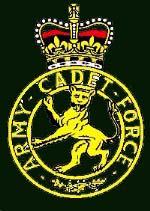 |
The Army Cadet Force is a
voluntary youth organisation providing challenging physical and mental
activities. It began 140 years ago and its aim today is to inspire young
people to achieve success in life with a spirit of service to Queen and
country and to the local community as well as instilling in them the
qualities of a good citizen. The age range has varied from time to time,
always concentrating on the teenage years, but today recruitment is open
to applicants aged from 12-18.
The ACF has been described as a national youth movement sponsored by the
Ministry of Defence and the army to enable young people develop their full
potential by offering the discipline, military training and sport to be
found in most regular regiments, together with adventure courses and
expeditions specially designed for their age group.
But volunteers do not have to commit themselves to joining the army when
they enrol in the ACF although if they do wish to sign on when they reach
the required age of 17½, then they will have a head start on other
recruits. The ACF currently offers youth, both boys and girls, the chance
to have some fun, to do something different, to make new friends, learn
new skills, learn how to accept responsibility, learn leadership,
teamwork, confidence, loyalty and self-reliance and by testing themselves
to the limit, experience a sense of achievement. They are also taught
drill, turnout, skill at arms, shooting, the use of maps and compass,
field craft, first aid and physical training and there are also many
opportunities for adventurous activities such as canoeing, abseiling, rock
climbing, mountaineering and orienteering.
More than 50,000 youngsters are currently in training with detachments
throughout the United Kingdom, four of them in Lincolnshire and one of them
has a representation in Bourne. All instructors have been specially
trained and units have their own doctors, padres and chefs.
Cadets are required to pay a subscription of 50p a week while a weekend
camp will cost around £5, which includes food, transport and accommodation
and an eight-day annual camp is £25. Uniforms are provided free but cadets
have to buy their own boots.
The first Army Cadet Force for Bourne was raised during the Second World
War of 1939-45 under Lieutenant Colonel Horace Stanton, who also commanded the
local battalion of the Home Guard. It was a thriving unit which met at the
Vestry Hall in North Street, then the town's drill hall, but soon expanded
sufficiently to justify its own premises that were opened in Manor Lane in
1952.
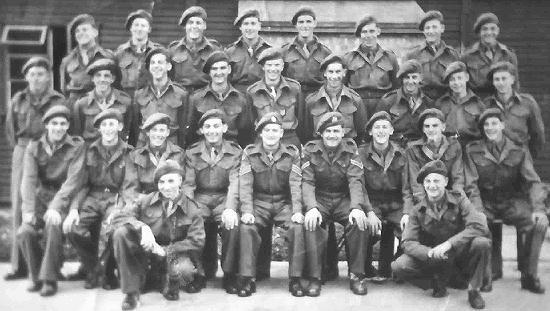
The wooden building was fitted out with money from various fund raising
projects such as the fete which was held in the grounds of Colonel
Stanton's home at No 20 North Road on Saturday 24th July 1954 when £150
was collected to pay for furnishings and sports equipment. The Sleaford
ACF band paraded through the town before the fete was declared open by
Lieutenant Colonel H Rigall, chairman of the County Cadet Committee, who told
the gathering that the War Office had sanctioned the erection of the
building and it was among the best in Lincolnshire. He went on: "The main
objective of the cadet force is to turn a boy into a good citizen by
giving him mental, moral and physical training. This provides them with a
better chance of promotion and success in the regular services." He also
appealed to serving cadets to bring along their brothers and friends to
join the force and he urged parents to help the organisers in every way
their could.
However, the retirement of Colonel Stanton, who was also deputy commandant
for the county of Lincolnshire, was a blow to the unit and as a result of
his departure, coupled with a shortage of officers, support dwindled and
eventually the detachment was disbanded.
Interest was revived in 1962 due entirely to the efforts of one man,
Major Kenneth Sindall, of Stamford. He re-launched the Bourne detachment
in January of that year with a ceremony at the ACF headquarters attended
by Colonel Sir Hugh Cholmeley, DSO, chairman of the Lincolnshire
Territorial Association, who formally declared the headquarters open
again. Also at the opening was the Vicar of Bourne, Canon H P Laurence,
who was a padre with the Lincolnshire Regiment during the Second World
War, Dr John Galletly, chairman of Bourne Urban District Council, and
police inspector Leslie Ferriby.
Sir Hugh told the gathering: "Bourne should be proud of its link with the
Army Cadet Force which began during the middle years of the war and played
its part in the training and sport of the movement throughout the county.
I feel there is still a good potential in the town to repeat that past
success but it is important to get energetic and enthusiastic officers.
Major Sindall is such a man, energetic and keen and who has served all
over the world and I am sure he will bring the unit back and justify the
reopening of the unit's headquarters. I hope that the people of Bourne,
and particularly parents, will give him every support because the Army
Cadet Force is one of the most valuable youth movements that exists today.
It teaches leadership, comradeship and initiative to our young men at the
impressionable age of 14 to 18. It is character forming and there has to
be discipline but that has done no one any harm but those who join will
learn with fun as well as discipline and it is possible for anyone with
real promise to represent their county or command in various competitions
all over the country."
The ACF headquarters were open every Tuesday and Thursday night between
7.30 pm and 9.30 pm to enable youngsters join.
The Manor Lane building disappeared during development of
the area during the 1970s and cadets now meet at a tiny green
prefabricated hut in the Austerby, sited on the route of the old railway
line that crossed the road at this point.

|
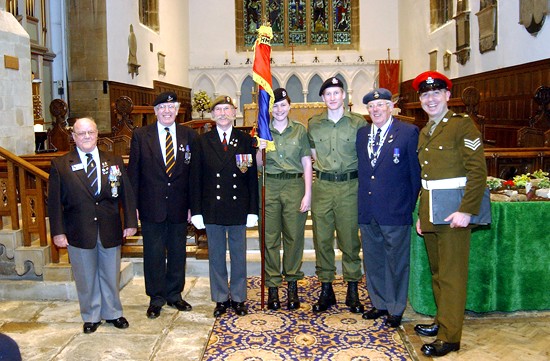 |
|
Over 100 people were in the congregation at
the Abbey Church on Wednesday 9th May 2007 for the unveiling and
dedication of the unit's new standard, financed by the Len Pick
Trust after the original one was stolen by intruders who broke into
the cadet headquarters in the Austerby. Those present included
cadets, civic leaders, parents, instructors and friends and
officials of the Bourne branch of the Royal British Legion who had
helped with the funding application.
Those in the picture above are (left to right) Brian Marsden, Canon
David Staples, Councillor David Higgs, Cadets Charlotte Cooke, aged
16, and Stuart Kershaw, aged 17, Tim Bladon, chairman of the Bourne
branch of the Royal British Legion and Sergeant John Burke, the
Bourne detachment commander. |
|
TROPHY WINNERS IN 2008 |
|
 |
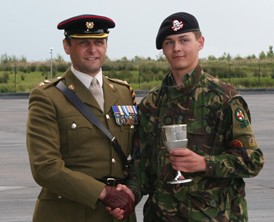 |
|
Cadets from the Bourne detachment were among
the trophy winners at the 2008 annual camp for Lincolnshire held at
Otterburn Training Camp in Northumberland from August 11th to the
20th. Around 400 cadets from the county attended the camp for a week
of military and adventure training including compass and map
navigation exercises, fieldcraft, target rifle shooting and skill at
arms training as well as rock climbing, abseiling, mountain bike
expeditions and a disco on the last evening. Accompanying the 27
cadets from Bourne was 2nd Lieutenant John Burke. The presentation
of trophies and achievements was held a the camp with Bourne cadets
winning three cups including the award for the most improved
detachment in the county, best shot in the county (Corporal Bertie
Wynne) while Cadet Katherine Heard won the award for the most
improved cadet in her Junior One Star Cadre (Cadre Three) and went
on to win the overall most improved cadet in the Junior One Star
Cadre in which 100 cadets participated. |
|
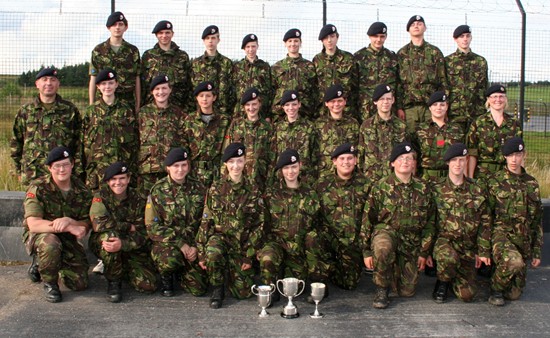 |

Go to:
Main Index Villages
Index
|


